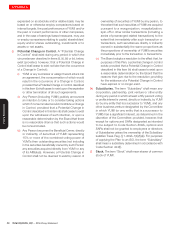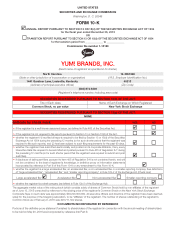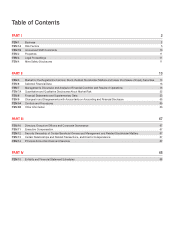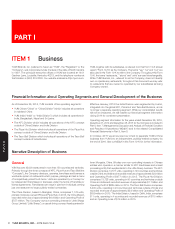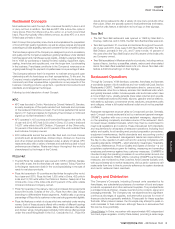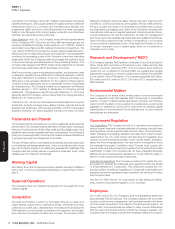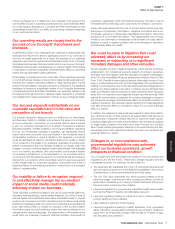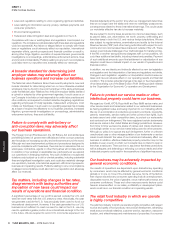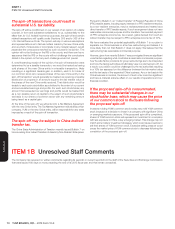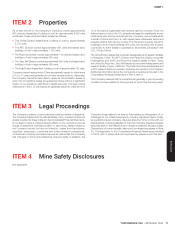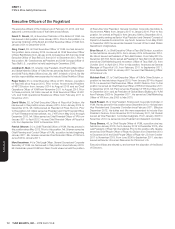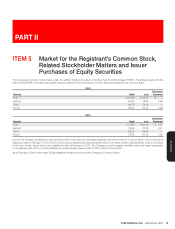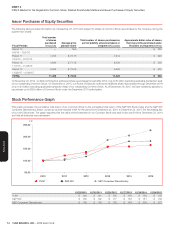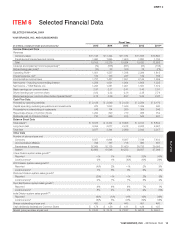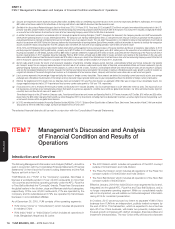Pizza Hut 2015 Annual Report Download - page 116
Download and view the complete annual report
Please find page 116 of the 2015 Pizza Hut annual report below. You can navigate through the pages in the report by either clicking on the pages listed below, or by using the keyword search tool below to find specific information within the annual report.
YUM! BRANDS, INC.-2015 Form10-K8
Form 10-K
PART I
ITEM 1ARisk Factors
•Laws and regulations relating to union organizing rights and activities.
•
Laws relating to information security, privacy, cashless payments, and
consumer protection.
•Environmental regulations.
•Federal and state immigration laws and regulations in the U.S.
Compliance with new or existing laws and regulations could impact our
operations. The compliance costs associated with these laws and regulations
could be substantial. Any failure or alleged failure to comply with these
laws or regulations could adversely affect our reputation, international
expansion efforts, growth prospects and financial condition or result in,
among other things, litigation, revocation of required licenses, governmental
investigations or proceedings, administrative enforcement actions, fines
and civil and criminal liability. Publicity relating to any such noncompliance
could also harm our reputation and adversely affect our revenues.
A broader standard for determining joint
employer status may adversely affect our
business operations and increase our liabilities.
The National Labor Relations Board has recently adopted a new and
broader standard for determining when two or more otherwise unrelated
employers may be found to be a joint employer of the same employees
under the National Labor Relations Act. If this joint employer liability standard
is upheld or adopted by other government agencies, it could cause us or
our Concepts to be liable or held responsible for unfair labor practices and
other violations, and required to conduct collective bargaining negotiations,
regarding employees of totally separate, independent employers, most
notably our franchisees. In such event, our operating expenses may increase
as a result of required modifications to our business practices, increased
litigation, governmental investigations or proceedings, administrative
enforcement actions, fines and civil liability.
Failure to comply with anti-bribery or
anti-corruption laws may adversely affect
our business operations.
The Foreign Corrupt Practices Act, the UK Bribery Act and similar laws
prohibiting bribery of government officials and other corrupt practices
are the subject of increasing scrutiny and enforcement around the world.
Although we have implemented policies and procedures designed to
promote compliance with these laws, there can be no assurance that our
employees, contractors, agents or other third parties will not take actions
in violation of our policies or applicable law, particularly as we expand
our operations in emerging markets. Any such violations or suspected
violations could subject us to civil or criminal penalties, including substantial
fines and significant investigation costs, and could also materially damage
our reputation, brands, international expansion efforts and prospects,
business and operating results. Publicity relating to any noncompliance
or alleged noncompliance could also harm our reputation and adversely
affect our revenues.
Tax matters, including changes in tax rates,
disagreements with taxing authorities and
imposition of new taxes could impact our
results of operations and financial condition.
A significant percentage of our profit is earned outside the U.S. and
taxed at lower rates than the U.S. statutory rates. Historically, the cash
we generate outside the U.S. has principally been used to fund our
international development. However, if the cash generated by our U.S.
business is not sufficient to meet our need for cash in the U.S., we may
need to repatriate a greater portion of our international earnings to the U.S.
in the future. We are required to record U.S. income tax expense in our
financial statements at the point in time when our management determines
that we no longer have the ability and intent to indefinitely postpone tax
consequences related to those international earnings. This could cause
our worldwide effective tax rate to increase materially.
We are subject to income taxes as well as non-income based taxes, such
as payroll, sales, use, value-added, net worth, property, withholding and
franchise taxes in both the U.S. and various foreign jurisdictions. We are
also subject to regular reviews, examinations and audits by the Internal
Revenue Service (“IRS”) and other taxing authorities with respect to such
income and non-income based taxes inside and outside of the U.S. These
reviews could include challenges of our methodologies for transfer pricing.
If the IRS or another taxing authority disagrees with our tax positions, we
could face additional tax liability, including interest and penalties. Payment
of such additional amounts upon final settlement or adjudication of any
disputes could have a material impact on our results of operations and
financial position.
In addition, we are directly and indirectly affected by new tax legislation
and regulation and the interpretation of tax laws and regulations worldwide.
Changes in such legislation, regulation or interpretation could increase our
taxes and have an adverse effect on our operating results and financial
condition. This includes potential changes in tax laws or the interpretation
of tax laws arising out of the Base Erosion Profit Shifting project initiated
by the Organization for Economic Co-operation and Development.
Failure to protect our service marks or other
intellectual property could harm our business.
We regard our Yum®, KFC®, Pizza Hut® and Taco Bell® service marks, and
other service marks and trademarks related to our restaurant businesses,
as having significant value and being important to our marketing efforts.
We rely on a combination of protections provided by contracts, copyrights,
patents, trademarks, service marks and other common law rights, such
as trade secret and unfair competition laws, to protect our restaurants
and services from infringement. We have registered certain trademarks
and service marks in the United States and foreign jurisdictions. However,
from time to time we become aware of names and marks identical or
confusingly similar to our service marks being used by other persons.
Although our policy is to oppose any such infringement, further or unknown
unauthorized uses or other misappropriation of our trademarks or service
marks could diminish the value of our brands and adversely affect our
business. In addition, effective intellectual property protection may not be
available in every country in which our Concepts have or intend to open or
franchise a restaurant. There can be no assurance that these protections
will be adequate, and defending or enforcing our service marks and other
intellectual property could result in the expenditure of significant resources.
Our business may be adversely impacted by
general economic conditions.
Our results of operations are dependent upon discretionary spending
by consumers, which may be affected by general economic conditions
globally or in one or more of the markets we serve. Some of the factors
that impact discretionary consumer spending include unemployment,
disposable income, the price of gasoline, stock market performance and
consumer confidence. These and other macroeconomic factors could
have an adverse effect on our sales, profitability or development plans,
which could harm our financial condition and operating results.
The retail food industry in which we operate
is highly competitive.
The retail food industry in which we operate is highly competitive with respect
to price and quality of food products, new product development, advertising
levels and promotional initiatives, customer service, reputation, restaurant
location, and attractiveness and maintenance of properties. If consumer


